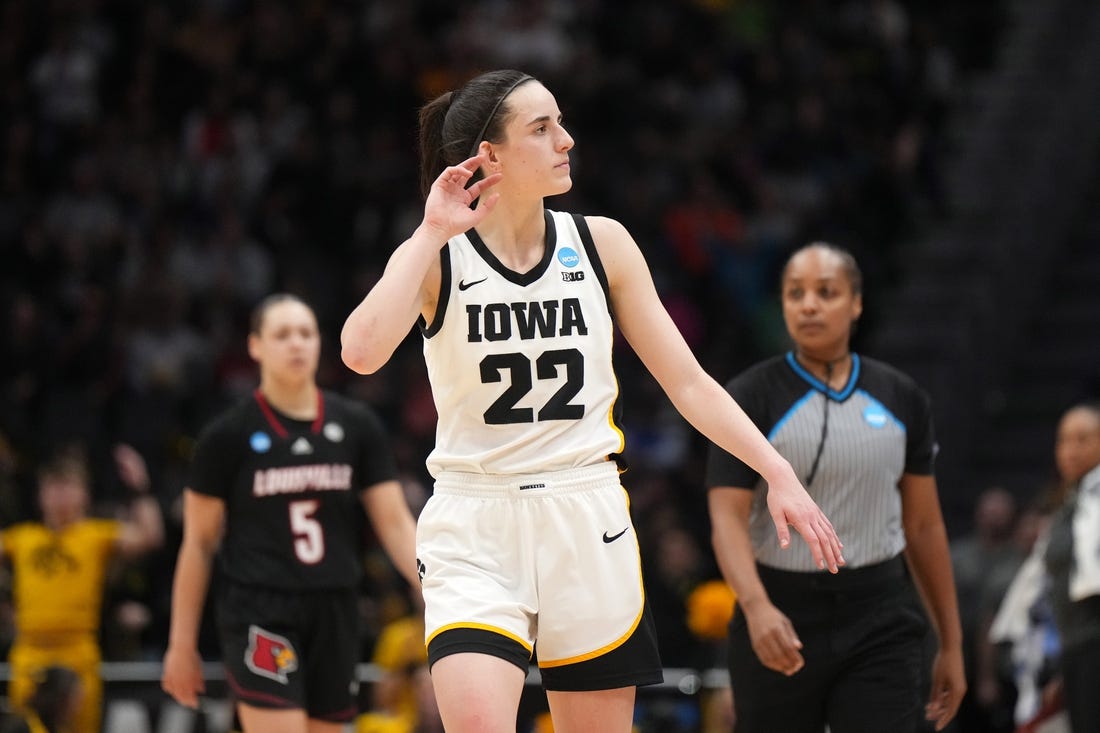It seems that every time we look up, Caitlin Clark is making history again.
No man or woman had ever posted a 40-point triple-double in an NCAA Tournament game before the Iowa guard dropped 41 points, 12 assists and 10 rebounds on Sunday. Clark’s opponent wasn’t some overmatched mid-major in the first round, but fifth-seeded Louisville in the Elite Eight.
Clark also became the first player in Division I women’s basketball history with a 900-point, 300-assist season. She’s averaged 30.0 points and 11.0 assists over the first four rounds of the tournament, Magic Johnson and LeBron James have sung her praises and on Wednesday she was named the Naismith Women’s College Player of the Year.
Up next in the Final Four is the proverbial immovable object — undefeated South Carolina, the defending champs. The result could be the biggest windfall for women’s basketball in years.
Clark is building herself a legacy, and her exploits are captivating basketball fans young and old. Iowa’s 97-83 win over Louisville drew an average of 2.5 million viewers to ESPN, more than any NBA game the network has shown all season.
The number to beat for the most-watched women’s Final Four game is 5.681 million viewers, according to Sports Media Watch, set by the 2002 championship game between UConn and Oklahoma. For context, last year’s South Carolina-UConn title game averaged 4.85 million.
South Carolina has begun to dominate the women’s basketball landscape in a manner not seen since UConn was at the peak of its power. Now coach Dawn Staley’s program faces its toughest test yet — as do Clark and the Hawkeyes.
“I think the biggest thing for us is just understanding this is a bigger stage, but we don’t have to be anything other than ourselves,” Clark said on ESPN. “Just go out there and play Iowa basketball. Obviously we’re gonna need to rebound and execute offensively.”
The Gamecocks not only head to Dallas on a 42-game winning streak, they also have a 281-34 record (89.2 percent) over the past nine seasons, with two national titles and two other Final Four trips. They have Aliyah Boston, last year’s Naismith winner and the two-time Defensive Player of the Year, averaging 12.0 points and 11.0 rebounds this tournament.
Staley wants to contain part of Clark’s multifaceted offensive game, understanding that even the Gamecocks’ third-ranked scoring defense won’t stop all of it.
“We really haven’t played against a player like Caitlin and her ability to have a big game, fill up the stat sheet,” Staley said. “… We have to take something away: her ability to score in bunches or her ability to distribute the basketball. She just really can’t have the full tilt of what she does.”
The showdown comes amid a pivotal time on the sports television front.
As it stands, ESPN is paying about $35 million a year for the rights to most NCAA championships outside football and men’s basketball. In upcoming negotiations, the NCAA may want the women’s basketball tournament spun off from the rest of the package, after a gender equity review showed it could earn closer to $100 million annually on its own.
If that’s the market value for these TV rights, the next generation of Caitlin Clarks and Aliyah Bostons could step into a much better-funded sport.
“We need to have the television coverage and we need to have the money in women’s basketball that it can provide,” Iowa coach Lisa Bluder said after the Louisville win. “We’ve been shortchanging ourselves for years and years. But certainly when you have a product like this that, you know, a game like this, it helps make it really seem like, yeah, this is a no-brainer.”
–By Adam Zielonka, Field Level Media

